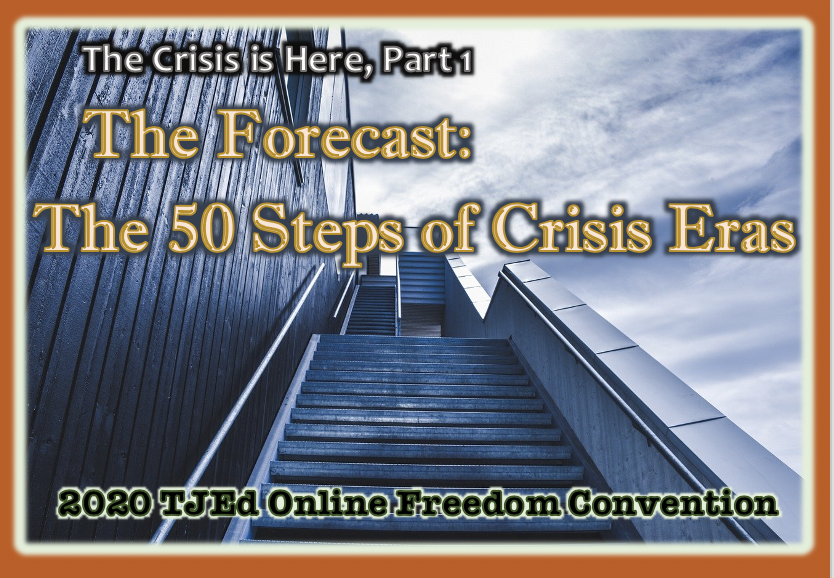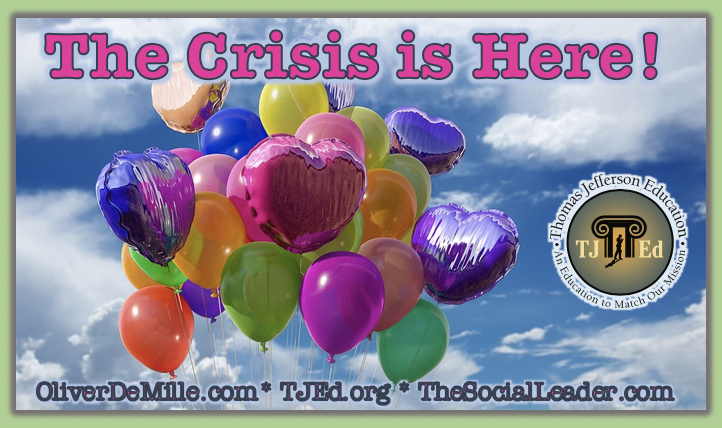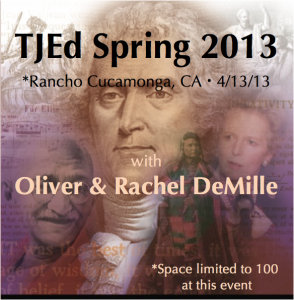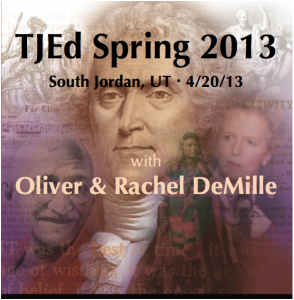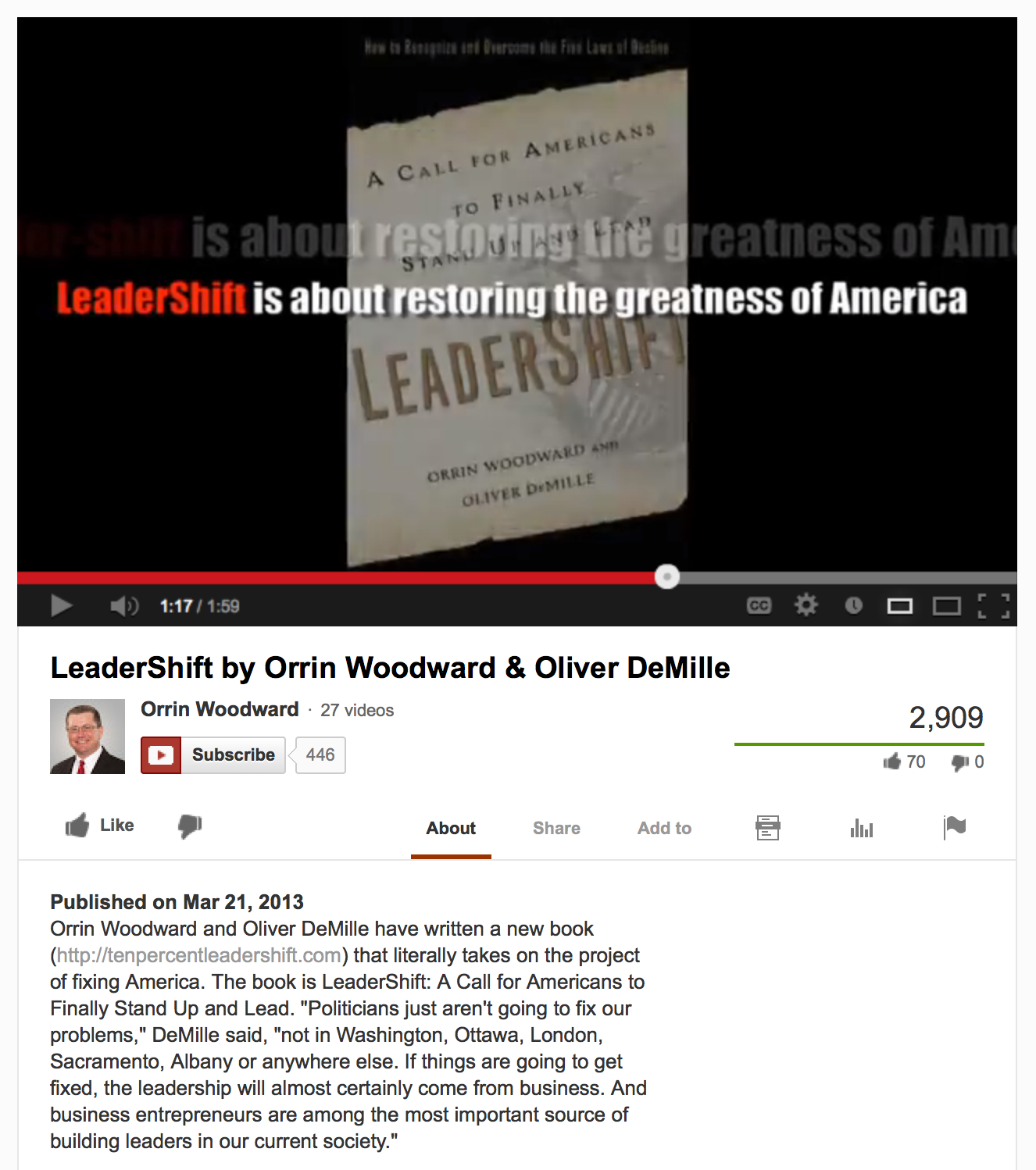The 2020 TJEd Online Convention is getting Rave Reviews!
April 6th, 2020 // 1:13 pm @ Oliver DeMille

Here’s what people are saying!
Many thanks to your whole family for all you do!
~ Jennifer Halverson
Watch the video trailer!
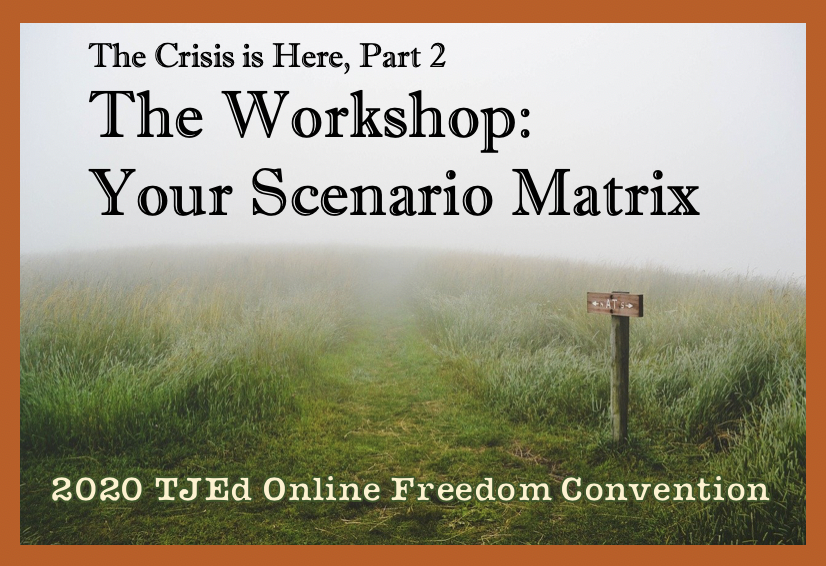 Listened to these talks in the convention today…I am speechless! I had chills the whole time I was listening! I’m excited to go back and do the planning section. Amazing how my perspective has changed so quickly. Going to have my husband listen, too. Thank you so much for this amazing resource!!!
Listened to these talks in the convention today…I am speechless! I had chills the whole time I was listening! I’m excited to go back and do the planning section. Amazing how my perspective has changed so quickly. Going to have my husband listen, too. Thank you so much for this amazing resource!!!
UPDATE: I just now worked through part of the matrix exercise. Wow, how powerful!
~ Rachael Breneman
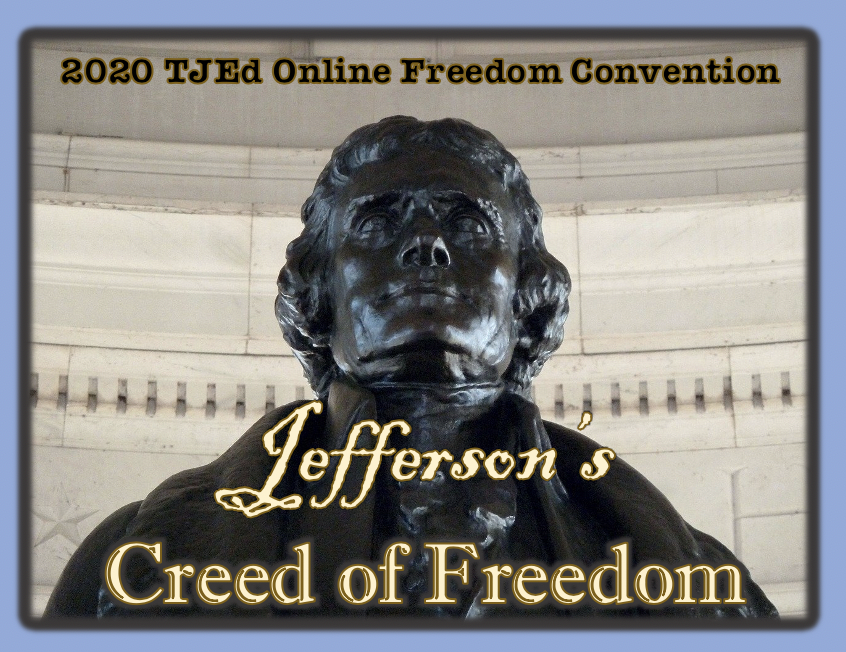 I just want to say thank you to you both. You have sacrificed so much for your mission and so many of us and our children have been blessed because of your sacrifice! I listened to The Crisis is Here part 2 from the 2020 Freedom convention today. On top of the wonderful exercise Oliver led and the incredible insight, I was also struck with how grateful I am that I have been so prepared for this moment.
I just want to say thank you to you both. You have sacrificed so much for your mission and so many of us and our children have been blessed because of your sacrifice! I listened to The Crisis is Here part 2 from the 2020 Freedom convention today. On top of the wonderful exercise Oliver led and the incredible insight, I was also struck with how grateful I am that I have been so prepared for this moment.
It is thanks in a large part to being mentored through TJEd that I have the family culture, understanding of turnings and history, life centered at home, classics on our shelves that teach us human nature, an appreciation for seasons and cycles and the confidence and ability to teach my family. While these times are uncertain, I don’t feel afraid or overly anxious. I’m actually looking forward to the next few decades and what “spring” will bring. I’m excited for my children and I to be a part of it!
~ Amy Updike
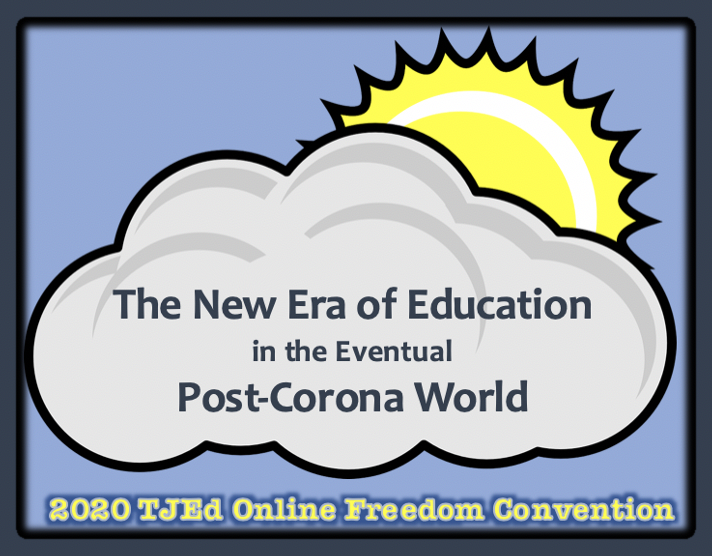 Before any of us realized what happened, the world changed, and it is very likely that for better or worse, nothing will be the same again.
Before any of us realized what happened, the world changed, and it is very likely that for better or worse, nothing will be the same again.
Now what?
I have learned a great deal from Oliver DeMille. The talks he has given already in this convention have really changed the way I am looking at what is happening right now, and he is just getting started.
If you want to know what to do to adapt to our new reality, I’d recommend signing up for this convention!
~ Colby Lyons
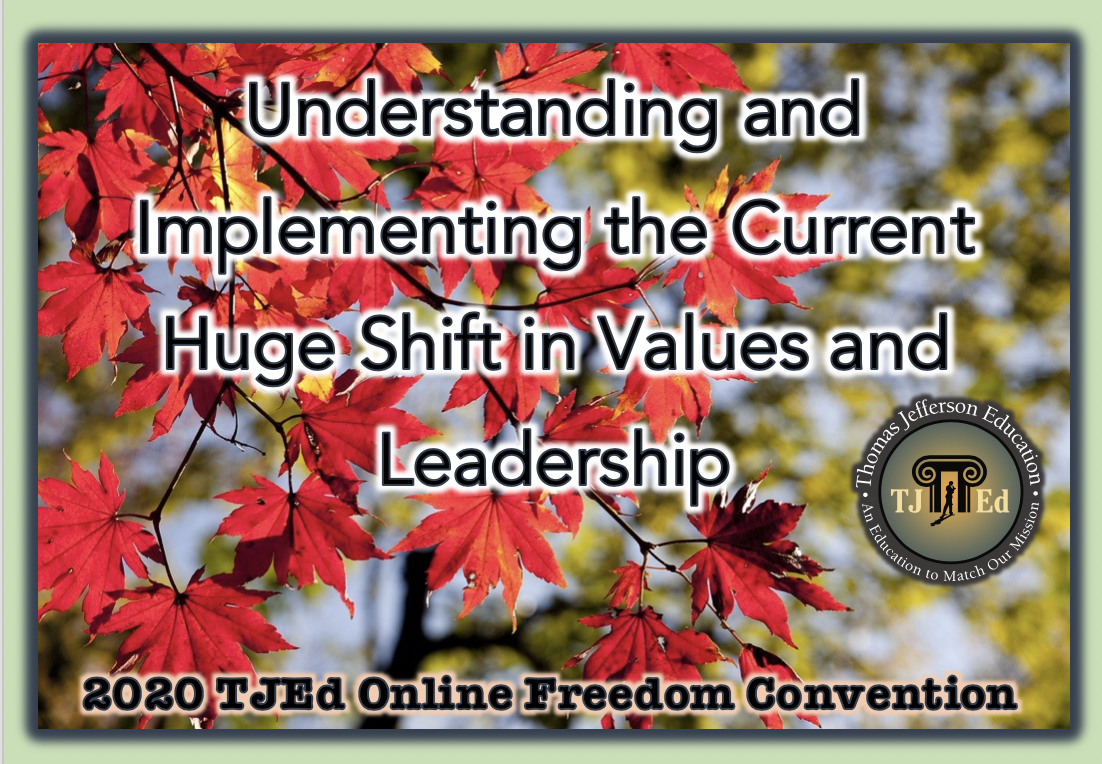 Oliver and Rachel, THANK YOU so much for this year’s convention! We just listened to the 2nd workshop and are so excited for this time in history!
Oliver and Rachel, THANK YOU so much for this year’s convention! We just listened to the 2nd workshop and are so excited for this time in history!
We’ve handled the crisis well because of our faith but this really got us pumped for our future!
My daughter, who is a senior, has struggled a little because she felt so uncertain of her immediate future.
Now, she’s happy and at peace that she is already on the right path to get through this crisis well. She loved the workshops so far! Can’t wait for the rest!
~ Kellee Clark
Watch the video trailer!
Join us for the 2020 Freedom Convention Here!
Special thanks to Lyle Mast of OR Sports for his contribution of 100 family scholarships!
And TJEd is matching that sponsorship to cover an additional 100 families!
If you need this assistance in order to participate in the convention, PLEASE don’t hesitate to request it; that’s exactly what it’s for, and we don’t want you to miss out!
Just click here to inquire and we’ll get you taken care of.
Category : Aristocracy &Blog &Business &Citizenship &Constitution &Culture &Current Events &Economics &Education &Entrepreneurship &event &Family &Featured &Generations &Government &History &Independents &Information Age &Leadership &Liberty &Mini-Factories &Mission &Politics &Producers &Prosperity &Statesmanship &Tribes
2020 TJEd Online Freedom Convention
March 24th, 2020 // 4:32 pm @ Oliver DeMille
Presented by
Oliver DeMille


Leadership Education (TJEd)
&
The Center for
Social Leadership
(What to do about it, and how to do it effectively—and what’s coming next)
Available for Online Access with All Content On-Demand
See here for detailed seminar content >>
ENROLLMENT
- Early Bird Enrollment (enrolled by March 31): $35! [Cost: $50 4/1/20 – onward]
- Bonus Sessions and Workshops 1 & 2 available immediately upon enrollment.
- The balance of the Convention Playlist will be released on 4/6, and is available April 6, 2020 – May 10, 2020, on-demand – so you can access it for the whole month, as many times as you choose.
- Enrollment cost includes participation for all members of a single household. Non-household friends and family should purchase their own access.
- Special class pricing available for schools. [contact sara@tjed.org to inquire]
Category : Blog &Current Events &event &Featured
What is Freedom?
June 17th, 2013 // 10:38 am @ Oliver DeMille
I frequently get asked something along the lines of, “Oliver, you talk a lot about freedom; but what, exactly, do you mean by the word ‘freedom?’ How do you define it?”
It’s a very good question. To answer it, I first want to define “liberty.” After all, the Declaration of Independence boldly affirms that among our inalienable rights are “…life, liberty, and the pursuit of happiness.”
Actually, the key word in this sentence is “inalienable,” and everyone should read the excellent article by Kyle Roberts on what this word really means.
Liberty and freedom are similar, but they are slightly distinct, and understanding them both is essential in a society that is losing its freedoms.
Liberty
As for “liberty,” I define it as “the right to do whatever a person wants as long as it doesn’t violate the inalienable rights of anyone else.” Of course, in order to exercise liberty, a person needs to know what inalienable rights are—otherwise, he won’t know whether or not he is violating them.
Thus knowledge and wisdom are required to maintain one’s liberty, because a person who violates somebody else’s inalienable rights naturally forfeits his own liberty. The extent of this forfeiture is equivalent to the depth of the violation—when this is applied well, it is called justice.
License
License, as opposed to liberty, is defined as “the prerogative to do whatever a person wants or is able to do.” Note that this has often been used in history as an excuse to plunder, force or otherwise violate the rights of others. Thus license and tyranny are nearly always connected—the tyrant is tyrannical precisely because he takes license as he wills, and the person who pursues license eventually exerts tyranny of some kind.
Sometimes people pick one of the inalienable rights and use it to define “liberty,” such as: “Liberty is the right to do whatever a person wants as long as it doesn’t violate the property of another. Or … the life of another, etc. The problem with this type of definition is that though it is often accurate, it is also too limited. The violation of any inalienable right takes away one’s liberty.
Now that we have a definition of “liberty,” we can also define and compare the meaning of “freedom”:
Liberty: The right to do whatever a person wants as long as it doesn’t violate the inalienable rights of anyone else.
Freedom: A societal arrangement that guarantees the right of each person to do whatever he/she wants as long as it doesn’t violate the inalienable rights of anyone else.
“Liberty” comes from the Latin root liber though the French liberte, meaning “free will, freedom to do as one chooses … absence of restraint” (Online Etymology Dictionary). In contrast, the word “freedom” was rooted in the Old English freodom, which meant “state of free will; charter, emancipation, deliverance” (ibid). Thus liberty could exist with or also without government, but freedom was usually a widespread societal system that required some authority to maintain it.
In most eras of history, the goal is liberty, but it is almost never maintained without freedom. In other words, it is possible to have liberty without freedom, but in such cases it seldom lasts very long and it is usually only enjoyed by a limited few.
When freedom is present, however, liberty exists for all who don’t violate the inalienable rights of others.
What About Now?
This trip down memory lane has an important current application. A lot of people want liberty; in fact, nearly everyone desires liberty. But the only duty of liberty is to honor the inalienable rights of everyone else, and as a result liberty without freedom is fleeting.
In contrast, freedom requires many more duties, and therefore it musters much more from its people. It only succeeds when the large majority of people in a society voluntarily fulfill many duties that keep the whole civilization free.
To repeat: those who stand for freedom must honor the inalienable rights of all, and they must also take responsibility for standing up and helping ensure that society succeeds. No truly free government directs this free and voluntary behavior, but without it freedom decreases.
For example, one of the duties of those who support freedom is free enterprise—to take action that improves the society and makes it better. No government should penalize a person who does not do this (such penalties would reduce freedom), but overall freedom will decrease if a person has the potential to take great enterprises that improve the world, but doesn’t.
Thus freedom is very demanding. If people don’t voluntarily do good things, and great things, freedom declines. If they don’t exert their will and take risks to improve the world, freedom stagnates and decreases.
Freedom and Morality
Another way that people voluntarily increase freedom is by choosing morality. In societies where a lot of the people don’t choose a moral life, liberty may be maintained by some people but the freedom of all people eventually declines. When more people choose the path of virtuous living, freedom grows.
The same is true of charity and service. When more people choose it, freedom increases. There are a number of other ways people can voluntarily take actions that have a direct and positive impact on freedom. In the freest societies, a lot of the people choose to engage in many such behaviors.
When we pledge allegiance to the flag, we do so to promote “…liberty and justice for all.” This is the role of government—liberty and justice, or in other words the protection of inalienable rights and the providing of recompense if such rights are violated.
But while in free nations government is limited to this role, the people in a free society must do much more. If they all do their best, fully living up to their potential, freedom greatly increases.
In other words, the real question isn’t “What is freedom?” but rather “What is my role in freedom?”
The answer is different for each person, but the key is to not worry about how other people use their freedom. As long as they aren’t violating inalienable rights, they won’t hurt you. Your focus (and my focus, and each individual’s focus) should be, simply, “Am I living up to my full potential, my great life mission and purpose in this world?”
If your answer to this question is “yes,” you are a promoter of freedom and your efforts and projects will help increase freedom for everyone. If not, now is the time to get started…
Category : event &Featured &Foreign Affairs &Information Age &Liberty &Mini-Factories &Mission &Politics &Statesmanship &Technology &Tribes
Free to Learn (book review by Oliver DeMille)
June 14th, 2013 // 10:20 am @ Oliver DeMille
Peter Gray’s book Free to Learn is an excellent addition to the genre of books on restoring freedom in education.
Gray clearly states:
“Children are biologically predisposed to take charge of their own education. When they are provided with the freedom and means to pursue their own interests, in safe settings, they bloom and develop along diverse and unpredictable paths, and they acquire the skills and confidence required to meet life’s challenges. In such an environment, children ask for any help they may need from adults. There is no need for forced lessons, lectures, assignments, tests, grades, segregation by age into classrooms, or any of the other trappings of our standard, compulsory system of schooling. All of these, in fact, interfere with the children’s natural way of learning.”
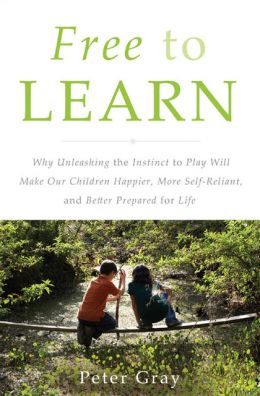 So why did we create schools that so directly “interfere with the children’s natural way of learning”? Gray shows that in tribal cultures the focus of childhood was playing and learning knowledge, skills, and how to live self-sufficiently and honorably.
So why did we create schools that so directly “interfere with the children’s natural way of learning”? Gray shows that in tribal cultures the focus of childhood was playing and learning knowledge, skills, and how to live self-sufficiently and honorably.
When the agrarian revolution increased the need for child labor on farms, the values of school turned to toil, competition and status. While Gray’s view of this is perhaps a bit idyllic, the reality is that modern schools are less concerned with student knowledge, skills, honor or abilities than with the universal goal of job training.
Certainly job training has an important place in advanced society, but Gray is focused on the education of children, and in fact the toll on children in our modern job-obsessed schools is very high. They are way more stressed than earlier generations of children and youth.
Why are we raising a generation of children and youth who are stressed, not secure? Gray’s answer, based on a great deal of research which he outlines in the book, is that we have turned learning into a chore, a task, a labor, rather than the natural result of curiosity, interest, passion to learn, and self-driven seeking of knowledge and skills. In short, we’ve taken too much play out of childhood and too much freedom out of learning.
The results are a major decline of American education in the last four decades. The solution is to put freedom back into education.
Interestingly, Gray suggests that in many of the educational studies of classrooms, schools, homes and teachers that have found a way to successfully overcome these problems and achieve much better educational results, one of the key ingredients is “free age-mixing.” Where students are allowed to freely mix with other students of various ages, without grade levels, the capacity of individuals to effectively self-educate is much higher. As for the impact on college and career success, students from free educational models excel.
This is a good book, and a must read for those who really care about education. I don’t agree with everything the author teaches, but I learned something important on almost every page.
Whether or not you read Free to Learn, all of us who have children or work in education need to do more to promote the importance of increased freedom in education. Gray is a particular fan of “unschooling,” a type of homeschooling and private schooling where parents and teachers set an example of great education, create an environment of excellent learning, and let the kids become self-learners. While this may not be the ideal learning style for every student, it is the best model for a lot of them–and for nearly every young person under age 12.
If you disagree with this conclusion, you simply must read the book. The research is impeccable. If you do agree, the book can help you get to work setting a better example for any students in your life.
Category : event &Featured &History &Leadership &Mini-Factories &Mission &Postmodernism &Prosperity &Statesmanship
Oliver DeMille Speaking Tour This Month
April 6th, 2013 // 9:51 am @ Oliver DeMille
Forward and share!
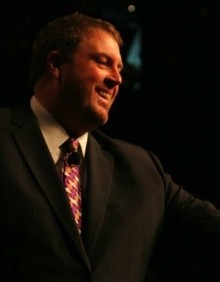 Oliver DeMille Speaking Tour This Month
Oliver DeMille Speaking Tour This Month
Specific information on each event follows – scroll down for details.
Important updates to the speaking schedule:
1. Registration almost closed on CA:
As of this email send, the Rancho Cucamonga event currently has less than 20 seats available; so if you’ve been holding back or have a friend or family member you want to have attend with you, please secure your registration today.
We have people flying and driving from quite a distance for these seminars, so please don’t assume you’ll be able to show up and be accommodated. We would be so disappointed if there wasn’t room for you!
2. Early Bird for South Jordan:
Because of our demanding travel schedule during the week prior we will be unavailable for last minute issues, and are therefore are urging early registration for the South Jordan event. To incentivize this, $75 seminar cost will be raised to $95 for those registering on Tuesday, April 16th and thereafter.
Please share this opportunity, and the early bird deadline, with your TJEd friends and groups, as well as those interested in learning more about Leadership Education.
3. Other events:
Additional speaking and book signing events for the LeaderShift publication tour are listed here.
9th KEY SEMINAR INFORMATION
The 7 Keys of Great Teaching are the crux of great education. When they are effectively applied in any home, school or other educational setting, learning drastically increases.
The 8th Key (Security, not Stress) teaches that the happiest, most effective teachers and parents approach teaching with a relaxed, enjoyable attitude when they are well versed in and fully understand the principles they are teaching; and that this helps students really internalize the critical lesson that learning is fun and doesn’t require overwhelming stress to accomplish.
The Ninth Key
In this brand new seminar by Oliver and Rachel DeMille, learn the 9th Key of Great Teaching, a key that will take all your learning, teaching and parenting to a whole new level! In this exciting event you’ll learn how to improve mentoring, and you’ll learn how to inspire your students with a whole new technique that makes all the difference.
The 9th Key is revolutionary and powerful. Don’t miss this opportunity to learn it, how to apply it effectively, and how to get started right away. Whether you are a veteran or newcomer to TJEd, or anywhere in between, this seminar will help you drastically improve your education and that of everyone you mentor!
Seminar Details, Rancho Cucamonga, California
-
The TJEd Spring 2013 SoCal seminar will be held on Saturday, April 13 at the Rancho Cucamonga James L. Brulte Senior Center (location info here)
-
There are only 100 seats at this event (less than 20 left now!), so enroll early to get in—first come, first served
-
Schedule:
9:30 am: The 5 Foundations of all Great Leadership Education, by Oliver DeMille
10:30 am: The 8 Types of Education, by Oliver DeMille
11:30 am: The Ninth Key!: A Whole New Level of Great Education, by Oliver DeMille
12:30 pm: Panel/Lunch Break (please bring your lunch to enjoy the contributions of a moderated panel of veteran TJEd educators while you eat)
1:30-2:30: Questions and Answers with Oliver & Rachel DeMille
(Bring your questions about your family’s education, your students, and your classroom if you are a full-time teacher!)
-
Cost: $75 per person
To enroll in the Rancho Cucamonga Seminar,
click here >>
********************
Seminar Details, South Jordan, Utah
-
The TJEd Spring 2013 Utah seminar will be held on Saturday, April 20 at the Paradigm High School (location here)
-
Schedule:
9:30 am: The 5 Foundations of all Great Leadership Education, by Oliver DeMille
10:30 am: The 8 Types of Education, by Oliver DeMille
11:30 am: The Ninth Key!: A Whole New Level of Great Education, by Oliver DeMille
12:30 pm: Panel/Lunch Break (please bring your lunch to enjoy the contributions of a moderated panel of veteran TJEd educators while you eat)
1:30-2:30: Questions and Answers with Oliver & Rachel DeMille
(Bring your questions about your family’s education, your students, and your classroom if you are a full-time teacher!)
-
Cost: $75 per person through 4/15; thereafter, $95
To enroll in the South Jordan, UT Seminar,
click here >>
***********

